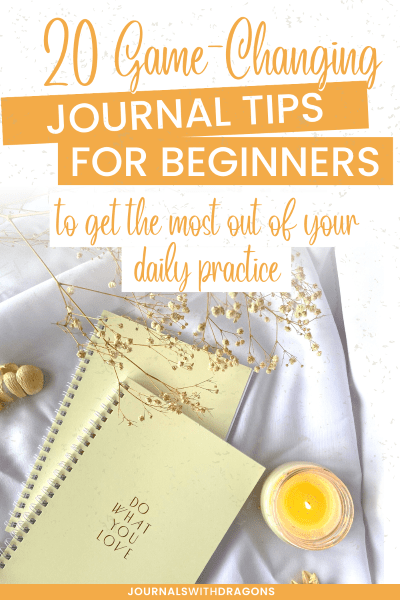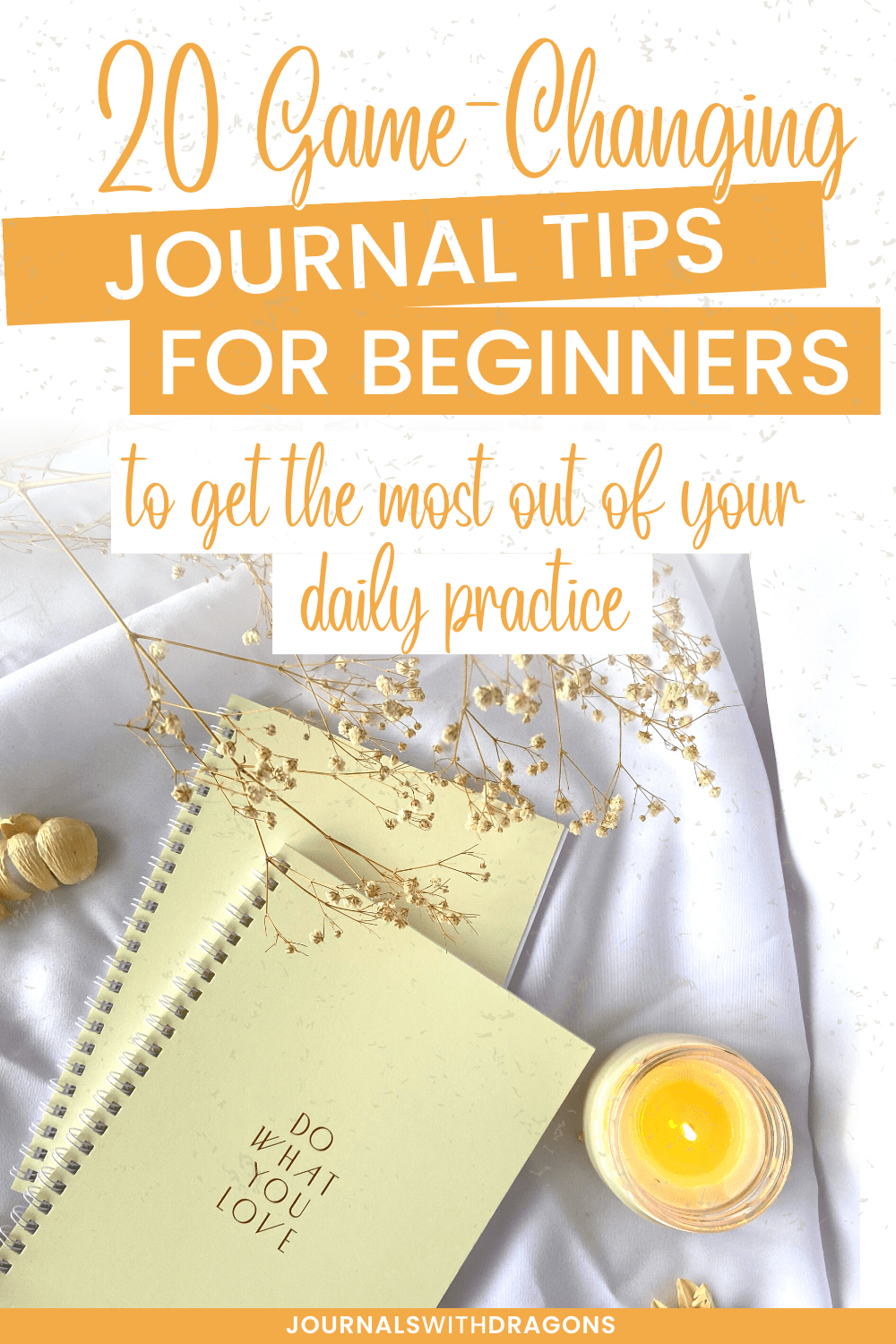This post contains affiliate links. Which means I will make a commission at no extra cost to you should you click through and make a purchase. Read the full disclosure here.
If you’re new to journaling, the thought of where to start can be daunting. Where do you start? What should you write about?
Thankfully, we’ve compiled these 20 best journal tips for beginners to help you get the most out of your new habit.
Whether you’re using your journal for reflection, goal-setting, bullet journaling, or something else, these tips will help make the experience more beneficial for you.
So grab a pen and paper, and let’s get started!
- 1. Experiment With Your journaling
- 2. Learn From Others
- 3. Start A Mood Board
- 4. Don't Compare
- 5. Write Down Your Day, Thoughts & Feelings
- 6. Collect Some Go-To Journal Prompts
- 7. Start Small & Simple
- 8. Try Getting Creative With Your Journal
- 9. Find Your Favorite Place To Journal
- 10. Don't Forget To Enjoy It
- 11. Avoid Perfectionism
- 12. Use An Old Journal For Practice
- 13. Be Gentle With Yourself
- 14. Allocate Time To Journal
- 15. Use A Tracker
- 16. Take A Journaling Challenge
- 17. Be Honest
- 18. Keep It Handy
- 19. Take Time To Evaluate
- 20. Be Realistic With Your Expectations
- Try These Journal Tips For Beginners For Yourself!
1. Experiment With Your journaling
One of the beautiful things about journaling is that it can be tailored to each individual, allowing you to make it your own special practice.
But you won’t find your own journaling method if you don’t experiment. Try out different approaches to journaling, such as:
- Keeping a digital vs. paper journal
- Different types of journals, like bullet journaling, gratitude, dream journaling, and more
- Trying different writing prompts to get ideas flowing
- Setting a journaling schedule or free-flow journaling
- Creating an art journal vs. a more writing-focused one
- Finding ways to make journaling enjoyable, such as playing some music while journaling.
- Trying different times to journal, like as part of your morning routine, midday, or even the evening.
Over time as you experiment, you’ll discover which journaling techniques work best for you. Who knows what style and methods you might unlock by playfully experimenting this way!
Allow yourself to have fun with it, and trust that the time you spend in your journal will bring new clarity and insights into your life.
2. Learn From Others
While journaling is ultimately a personal practice, there’s no harm in learning from the journaling methods and techniques other people use.
You can learn about more practical aspects of journaling, like specific techniques and types of journals people keep. (#)
Or you can learn by discovering other people’s journaling styles by checking out their journals. Many people share their creations online on Pinterest, Instagram, and personal blogs.
You can even find some friends to journal with! Connect with people who journal and exchange tips, insights, and stories to help each other grow in your journaling practice.

3. Start A Mood Board
It’s easy to get overwhelmed with so many ideas to journal and all the different styles, layouts, types of pages, and more.
Instead of letting yourself get into a frazzle or worrying about forgetting some cool idea you just discovered. Why not start a mood board to collect everything together and keep it where you plan to journal?
This could be a corkboard, whiteboard, or magnetic board on your wall. Or a completely separate journal that you can use to stick pictures or doodle ideas.
You could even use a sketch pad or some A3 sheets of paper that you stick together, which you can then fold up when you don’t need it.
Alternatively, you could create a digital mood board on Pinterest or Evernote. There you can easily keep all your journaling ideas together and access them whenever you want.
4. Don’t Compare
By this, I mean don’t judge yourself or your journal practice against others.
It can be so easy to look at someone else’s beautiful journal and compare it to your own, feeling like you’ll never measure up.
But the truth is, you’re just getting started on your journey.
It’s okay to be inspired by others, but don’t forget that your journal and your progress are unique to you. You’re on your own path, and you’re only at the beginning.
If looking at others makes you feel bad about yourself, try skipping it or working on your mindset with something like affirmations. The most important thing is that you keep moving forward on your own journey, one step at a time.

5. Write Down Your Day, Thoughts & Feelings
When you’re just starting out journaling, writing about your day, thoughts, and feelings can be a great way to get into the habit of journaling.
It can also help you to explore your thoughts and feelings more and see connections between them that you might not have otherwise noticed.
You can write about anything and everything that comes to mind. This is your journal, so there are no rules on what you can and cannot write about. Pour your heart out onto the pages and see where it takes you.
6. Collect Some Go-To Journal Prompts
If writing about your day seems boring or cliche. You could collect journal prompts from the internet or make up some of your own. (#)
Having some journal prompts to turn to can be helpful when you’re just starting out journaling, especially if you often find yourself stuck with writer’s block.
You can find journal prompts online, or you can create your own list of journal prompts that are specific to your needs.
For example, if you want to focus on improving your self-awareness and emotional balance, make a list of journal prompts that focus on these topics.
Some ideas for journal prompts you could use are:
- 57 Daily Gratitude Journal Prompts For Thought-Provoking Inspiration
- 60 FREE Printable Shadow Work Journal Prompts
- 113 Journal Prompts For Beginners + 5 Types To Explore On Your Journey
7. Start Small & Simple
When it comes to journaling there’s no need to start with the most complicated journal pages ever.
Start small and simple, like you wouldn’t want to start with a full bullet journal. Instead, try starting with a tracker or a daily spread, as they’re smaller parts of it.
Additionally, don’t try to write entire pages to begin with. Instead, you can start by writing down only a few sentences daily if that feels more manageable. Or just a single word if that is what works for you.
This way, you’ll slowly get used to journaling. Then when you feel ready, you can expand your journal writing into more topics and creative journal pages.
Journaling also can be about more than just writing. Many people use their journals for creative practice like drawing and doodling too.
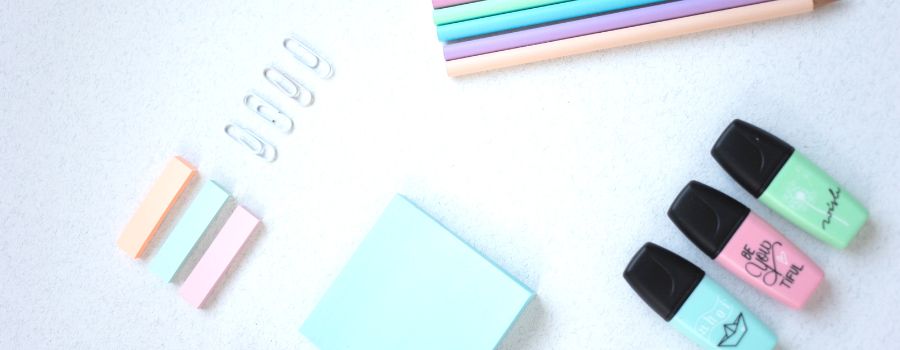
8. Try Getting Creative With Your Journal
Speaking of journaling not always having to be about writing. Have you considered using your journal as a creative outlet?
You could journal with paints, markers, and pencils or collages using image cutouts. You might even decide to try using a journal to practice your drawing skills. You don’t have to be an amazing artist! Just doodle whatever comes to mind.
Some like to create an entire art journal where instead of writing each day, they draw instead.
Others like to use a bullet journaling style, where they design journal pages and use them as a way to journal with both writing and drawing.
You could even just use your journal to do daily coloring exercises if that’s what you want to do.
If drawing isn’t really your thing, you can still be creative by decorating your pages or journal cover with all manner of craft materials like:
- Washi tape
- Stickers
- Sequins
- Glitter
- Pressed flowers and leaves
9. Find Your Favorite Place To Journal
Finding your favorite journaling spot can help you to journal more regularly.
Every day, carve out a few minutes just for journaling and find a comfortable spot in your home or outside that helps you to relax and get creative.
Ideally, it should be somewhere quiet so you can focus more easily and not be distracted. But if this is difficult, try using music without any lyrics or a place without any distinct noise, like the background bustle of a cafe.
I also suggest aiming for at least 15 minutes where you can journal uninterrupted. This may be difficult if you have kids or a busy work schedule, but it’s important to find some time for yourself.
So if you’re struggling to get some free time in your favorite spot, you can always try to wake up 15 minutes earlier or go to bed 15 minutes later so you can have some time alone.
10. Don’t Forget To Enjoy It
Remember that journaling should also be a fun experience rather than a chore (at least for the most part). It’s an opportunity for self-care and to express your thoughts in a safe, comforting space.
After all, if you find journaling enjoyable, you’re more likely to keep going.
For example, try to get a nice journal that inspires you. This doesn’t have to be expensive (any notebook will do), but make sure it’s one you’ll want to write in. Some ideas could be a watercolor cover or pretty inner pages.
Once you find one you love, keep it someplace handy so you’re excited and ready to write in it.
Additionally, you could use some of your favorite stationary or materials like washi tape or stickers to decorate.
Or how about enjoying your favorite coffee, tea, or alternative beverage while you journal? That’s a little extra self-care boost and making your journal routine all the more enjoyable too.
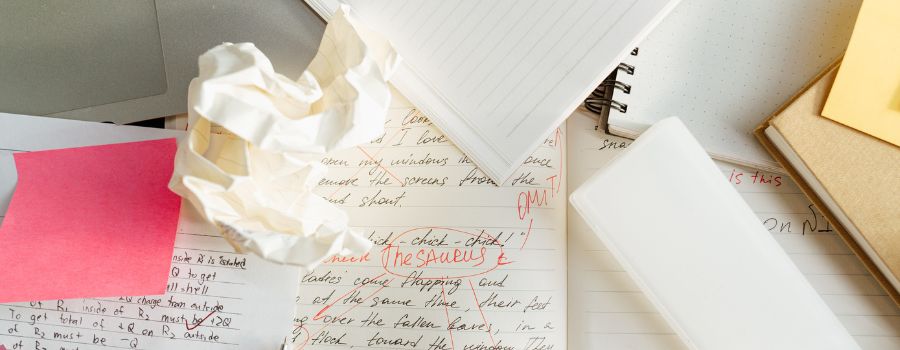
11. Avoid Perfectionism
Be messy with your journal, and don’t be afraid to make mistakes.
It’s important to remember that your journal is for you and no one else. This means there’s no need to worry about grammar, spelling, or punctuation.
Just write or create whatever comes into your head—it doesn’t have to be perfect.
In fact, the more imperfections, the better, as you can learn more from them! Your journal is a safe space for you to express yourself, so don’t hold back.
12. Use An Old Journal For Practice
Do you ever worry about ruining a page or making a mistake? Perfectionism can be a real journal killer.
And while you can try to avoid it, sometimes it’s a pretty tough habit to break. So one of my favorite journal tips for beginners you can try is using an old or less fancy journal rather than a brand new journal with an amazing front cover you just bought.
If it’s old, already used, not as nice looking, or simply just something cheap. There’s a greater chance you’ll be less afraid of ruining it while you figure things out and experiment.
Then you can always transfer or replicate your best pages and favorite methods into your new shiny journal and use it to collect your best creations.
13. Be Gentle With Yourself
Be gentle with yourself and celebrate the small wins. You can even write down your accomplishments for the day as part of your journaling process.
Above all, journaling is a judgment-free zone. It’s okay if you don’t journal every day or if some days your journaling is lacking in creativity—you’re allowed to take breaks, and that’s totally normal.
So be kind to yourself rather than being harsh.
If this is something you struggle with, try including some positive mindset activities into your journal or writing some positive affirmations to remind yourself that journaling is there to help you, not hurt you.

14. Allocate Time To Journal
Like any new habit you want to start, you need to give it time in your schedule, especially if you have a busy schedule with all the adulting you’re doing.
Try allocating yourself a journaling time slot. Start with 10 to 15 minutes and then gradually increase it (if you want) as you make journaling a part of your daily routine.
You could even set alarms or reminders on your phone if this helps you remember when to journal.
You can try things like:
- Including it in your morning routine
- Doing it during your breaks at work
- Journaling on your lunch break
- Doing it after a specific activity like reading, walking, or exercise
- Adding it to your self-care routine (#)
- Using it to help clear your head before bed and reduce screen time
- Getting up 15 minutes earlier or going to bed a little later
15. Use A Tracker
To keep yourself motivated, consider using journaling trackers or calendar-style journal prompts. This can help you stay consistent and keep track of your journal activity.
You can also set yourself journal goals like writing every day for a month, creating something new each week, or sharing something in your journal at least once a week.
These journal objectives can help you stay focused and motivated to journal regularly. And when you reach them, celebrate your successes!
Trackers also give you the opportunity to take a moment to reflect, which is an important part of journaling, especially for beginners. Because they not only help you remember what happened each day but also process your progress, thoughts, and feelings about it all.

16. Take A Journaling Challenge
One way to get your journaling juices flowing is to take a journaling challenge.
You can do this by giving yourself challenges that you come up with, like completing a daily prompt for 30 days or creating a new bullet journal layout each week.
You can also look for journaling challenges online with prompts or activities that you can do over the course of a few days, a week, or even an entire month.
It really depends on how much time you want to invest in the challenge and what type of journaling you feel most comfortable doing.
If you’re looking for some structure or accountability in your journaling routine, challenges can be an effective option.
Some challenges you could try are:
- 30-Day Journaling Challenge
- Camp NaNoWriMo
- 14-Day Shadow Work Journaling Challenge
- 30-Day Gratitude Journaling Challenge
17. Be Honest
Part of the reason people find journaling so therapeutic is because it allows them to be completely honest with themselves without judgment.
So if something’s bugging you or you’re feeling particularly sad or happy about something, don’t be afraid to let it all out on the page. You might be surprised at how cathartic it can be.
If you struggle with being honest, try writing anonymously or journaling in a journal that nobody else can access, like using a lockbox, password, or a secret place.
This can help you feel more comfortable about being honest and authentic with your journal. Because no matter what you write in it, it’s for you and only you.

18. Keep It Handy
The more accessible journaling is for you, the more likely it will become a regular habit. Having things like your journaling materials nearby helps reduce any friction that might keep you from journaling.
Try having your journal in a place you can easily access, like on your bedside table, a desk drawer, or anywhere else near where you like to journal the most.
You could even take it with you as you go about your day so that you’ll have it whenever you need to journal throughout the day.
Try things like:
- Opting for a small journal like these pocket-sized ones
- Keeping supplies in a pencil case for taking on the go
- Investing in a tablet to help you journal digitally, so everything is stored in a handy app like Goodnotes or Notability
- Preparing journal prompts or ideas ahead of time to make journaling easier
- Having a dedicated desk or place to journal with supplies and your journal nearby, like in a desk caddy or draw organizer.
19. Take Time To Evaluate
Journaling can be a great tool for self-reflection. So make sure to regularly evaluate your journal entries and reflect on the progress that you have made.
Look back at what you wrote a few weeks or months ago, and notice how far you’ve come. It’s a great way to stay motivated as it helps to give journaling some purpose and momentum.
You could also use your journal to identify positive and negative patterns in your life. This way, you can work to break things like bad habits or mindset struggles and continue to nurture the positive ones instead.
Ask yourself things like:
- How often do you journal? Are you being consistent?
- How does journaling make you feel?
- What things do you like or dislike about journaling?
- What things could you improve?
- Does it feel like a chore? How can you make journaling more enjoyable?
- Is there anything that could make journaling easier for you?
- What goals or self-improvement has journaling helped you with?
- What journaling types have worked best for you? And what other types do you still want to try?
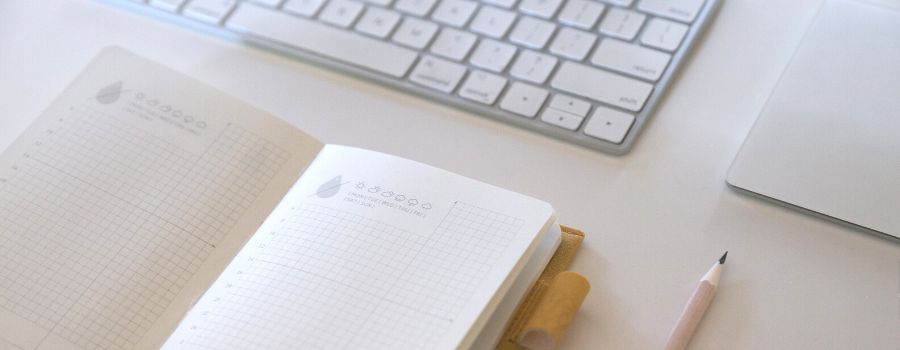
20. Be Realistic With Your Expectations
Last but not least, for these journal tips for beginners – remember to be realistic about journaling.
If you’re just starting, it’s understandable to want to journal every day or do longer journal entries. However, don’t put too much pressure on yourself if that isn’t feasible for you right now.
Start small and gradually increase the amount of journaling you do over time.
Journaling doesn’t have to be a major undertaking every day. It can be something that you do in little snippets throughout the week or even month if it works best for your lifestyle.
It’s also important to realize that whatever your goals are with journaling, things take time to work. So be patient, journal consistently even if you must go slowly, and give yourself grace when it comes to journaling!
Try These Journal Tips For Beginners For Yourself!
With these journal tips for beginners in mind, journaling should become a more enjoyable and rewarding experience. Give it a try, and you’ll soon see how journaling can really help you unlock your creativity and work towards personal growth. Good luck!

